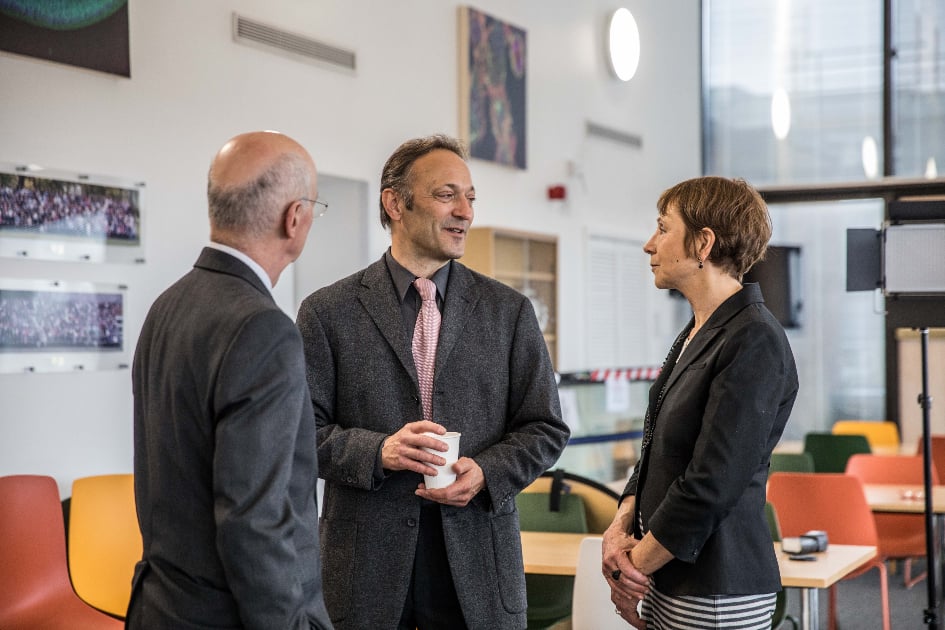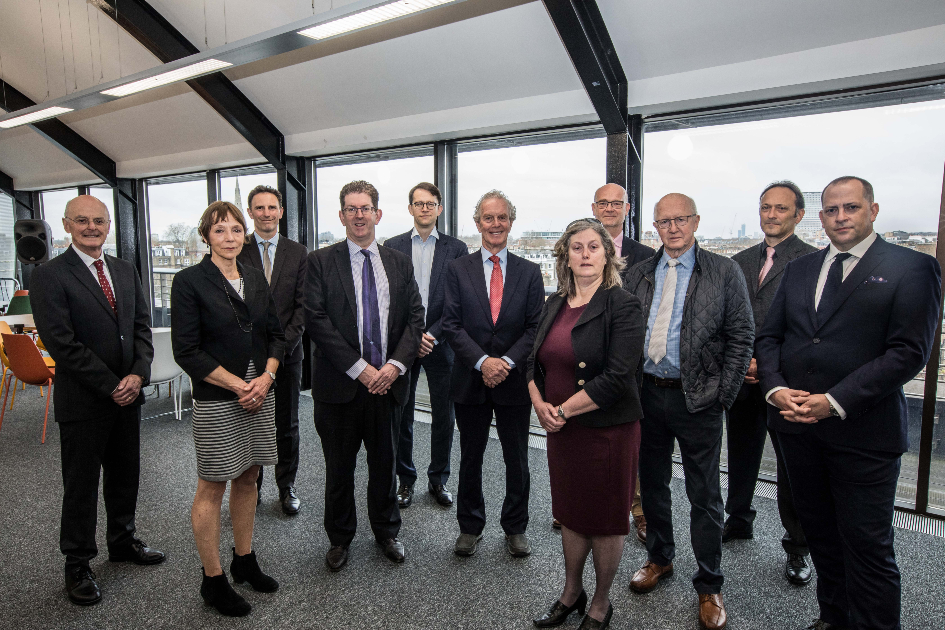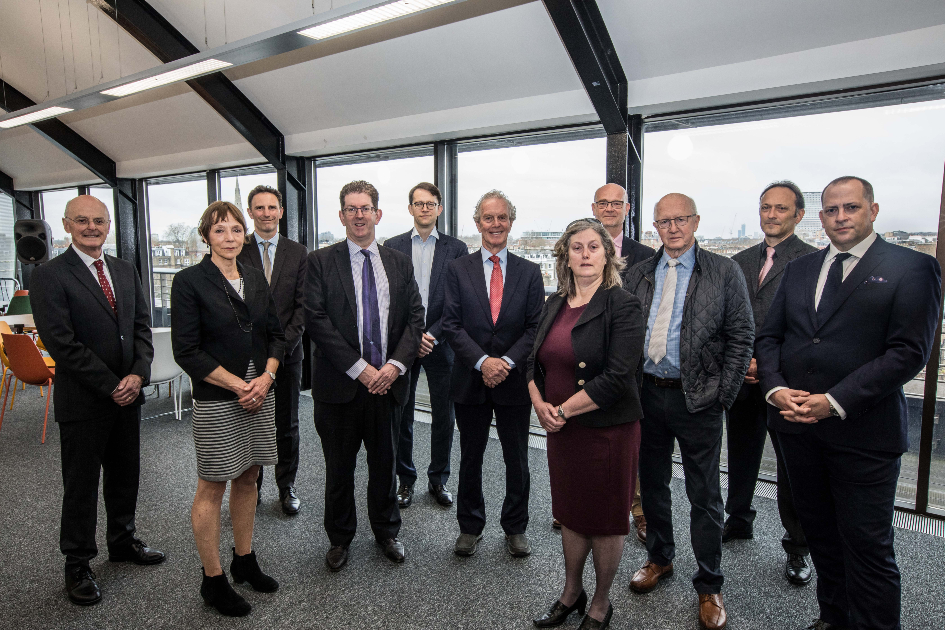
Image: Professor John Yarnold (left), Professor Pascal Meier (middle) and Professor Clare Isacke. Credit: soora.co.uk
As research efforts become bigger and more ambitious, there is a real need to bring together researchers with diverse scientific backgrounds and perspectives to solve complex scientific problems. This type of multidisciplinary approach taken by The Breast Cancer Team at the ICR and The Royal Marsden NHS Foundation Trust has been critical to their success in making transformational discoveries in breast cancer.
Twelve researchers from the ICR and The Royal Marsden Breast Cancer Team have been awarded the 2022 Team Science Award from the American Association for Cancer Research (AACR). The award recognises the significant contributions to the breast cancer research community made by the multidisciplinary team spanning a spectrum of discovery biology, molecular pathology, trial statistics and clinical science.
Here, we celebrate the team’s tremendous achievements, which are underpinned by more than two decades of research.
Identifying new ways to treat breast cancer
In 1995, Professor Alan Ashworth, then at the ICR but now President of the UCSF Helen Diller Family Comprehensive Cancer Center, was part of a team of researchers that discovered the second breast cancer susceptibility gene, BRCA2. Building on this work, Professor Ashworth and Professor Andrew Tutt (then Ashworth’s MRC Clinical Training Fellow and PhD student), along with a wider group in the Ashworth lab, uncovered the important role of the BRCA2 gene in DNA damage repair – revealing how it might be targeted with drugs such as carboplatin.
Together with Professor Chris Lord who had joined the lab, and Professor Steve Jackson’s team at the UK biotech company KuDOS, in 2005, they went on to identify the first synthetic lethal interaction between the BRCA1/2 genes and the DNA damage repairing enzyme Poly-ADP-Ribose Polymerase 1, or PARP1.
The concept of synthetic lethality is based on the dependency between a pair of cancer genes, where loss of function of either individual gene will allow the cancer cell to survive, but loss of function of both genes simultaneously will cause the cancer cell to die.
The collaboration with the KuDOS team, who had discovered a PARP inhibitor drug called olaparib, showed that blocking PARP1 caused cancer cells carrying BRCA1 or BRCA2 mutations to die. The striking results from the Ashworth lab stimulated Professor Tutt and the Ashworth group to design a Phase I clinical trial in 2008, together with ICR clinician scientist Professor Johann de Bono and Professor Stan Kaye at The Royal Marsden, that focussed on BRCA1/2 mutation carriers.
Commenting on the discoveries, Professor Lord said, “I think we knew from a very early stage that this was quite a significant finding. But at the time, we didn’t fully realise that it would go all the way to actually getting approved and used worldwide. For us lab scientists and clinician scientists, these are things that we came into research to do. From an emotional perspective, it is incredibly rewarding and an enormous privilege to be able to contribute to things that actually make a difference to people.”
The team’s collaborative efforts pioneered the use of synthetic lethality as a new therapeutic strategy in cancer. This has had a particular impact in breast cancer, as well as in ovarian, prostate and pancreatic cancer, where PARP inhibitors are also now used.
Phase III trials with olaparib, that followed the phase II proof of concept studies led by Professor Tutt in 2010, resulted in the drug’s approval in treating advanced BRCA1/2 mutated breast cancers. Olaparib was approved for breast cancer by regulators in the US, the Food and Drug Administration (FDA), in 2018, and in Europe, the European Medicines Agency (EMA), in 2019. The FDA and EMA have also approved the use of olaparib in ovarian, prostate and pancreatic cancers.
Transforming treatment for BRCA1/2 mutated breast cancers
The development and approval of olaparib has transformed how advanced BRCA1/2 mutated breast cancers are treated worldwide. Olaparib is the first cancer treatment targeted against an inherited genetic fault. This breakthrough has had a huge impact on thousands of people with breast cancer, enabling patients to live longer and have a better quality of life while receiving treatment.
More recently, the results from the OlympiA trial, that was led by Professor Tutt as the Breast International Group’s Global OlympiA Steering Committee Chair, revealed that adding olaparib to standard treatment for early-stage breast cancer in patients with inherited BRCA1/2 mutations can improve survival and reduce the risk of recurrence. The trial also supports testing for germline BRCA1/2 mutations, which has now been established as an important part of treatment selection in early breast cancer. The team’s findings have impacted international treatment guidelines for both breast cancer therapy and genetic testing.
Professor Tutt said, “This work brought together fundamental biologists, geneticists, biotech companies, early phase trials leaders and international collaborators at the phase III study stage. The award recognises the teamwork and amalgamation of skillsets required to change the way breast cancer is treated.”
Overcoming resistance to PARP inhibitors
While the use of PARP inhibitors has been largely successful, not all patients who have inherited a faulty BRCA1 or BRCA2 gene respond to PARP inhibitors. Professors Lord and Tutt and their team are trying to understand how cancer cells become resistant to these drugs. They are uncovering ways to overcome resistance by identifying molecules that can be targeted using different drug combinations.
Developing smarter, kinder treatments for patients is a continuous cycle from the lab to the clinic and back again. Professor Lord said, “Our collaboration with The Royal Marsden allows us to be a truly translational research centre. We can do biological research that informs new drug discovery projects and design of clinical trials, but we can also take observations from the clinic and feed them back into the lab where they can be dissected at a molecular level. This provides useful insight that can help to make new discoveries to overcome drug resistance.”
Our researchers regularly present their latest findings at the AACR Annual Meeting in the US.
Find our more about the AACR conference
Improving treatments for oestrogen receptor positive breast cancers
Oestrogen receptor positive, or ER+, breast cancer is the most common form of the disease – it makes up about 80 per cent of cases – and this is where the joint team made another major contribution recognised by the award. These cancers rely on oestrogen for their growth and can be treated using aromatase inhibitors that block the effects of the hormone.
The ICR and The Royal Marsden played a key role in the clinical development of aromatase inhibitors – assessing their effectiveness over the years. The team’s work in this field has been critical to understanding the biology of ER+ breast cancers and improving our knowledge of how these cancers become resistant to conventional hormone treatment.
Early trials involving Professor Mitch Dowsett found that aromatase inhibitors were better than tamoxifen – another type of hormone therapy for breast cancer – at preventing the recurrence of ER+ breast cancers.
A seminal trial co-led by Professor Judith Bliss, an expert trial statistician and methodologist, demonstrated improved relapse-free survival in patients that switched to the aromatase inhibitor exemestane after two to three years of tamoxifen treatment compared with tamoxifen alone for five years. This trial played an instrumental role in changing practice guidelines for use of aromatase inhibitors in the clinic.
Professor Stephen Johnston, a consultant oncologist at The Royal Marsden, led the large-scale international MonarchE trial which aimed to identify new treatments that overcome resistance in ER+ breast cancer. The results showed that adding the drug abemaciclib – a CDK4/6 inhibitor that prevents cell growth – to hormone treatment significantly reduced the risk of the disease coming back in high-risk patients with early breast cancers.
The MonarchE trial was based on many years of research done at the ICR and The Royal Marsden and was a collaboration between both organisations, Eli Lilly and numerous international investigators. Abemaciclib was approved for adjuvant therapy by the FDA in the US in 2021 and just this month by the EMA.
Professor Bliss said, “The ICR and The Royal Marsden bring together discovery science, clinical expertise and dedicated cancer specific trials methodology, which is ideal for designing scientifically robust, efficient and practice-changing clinical trials.”
Informing treatment decisions
Professor Dowsett and his team also discovered an important biomarker – Ki67, which marks newly divided cancer cells – to evaluate the effectiveness of aromatase inhibitors in patients. The biomarker was subsequently developed into a test that is used to identify patients who might particularly benefit from hormone therapy.
The POETIC trial involved Professor Dowsett, Professor Bliss and Professor Ian Smith, and enrolled postmenopausal women who were planned to receive an aromatase inhibitor for five years following surgery. By starting the aromatase inhibitor two weeks before surgery and looking at how the Ki67 biomarker changed in patients’ tumours following the short-term therapy, the researchers were able to distinguish groups of patients with different risks of their cancer coming back.
Some patients started with a low level of the biomarker which stayed low after two weeks of treatment. The patients in this group had a very low chance of their cancer coming back during the next five years, with many of these patients able to be treated with aromatase inhibitor therapy alone. A minority of these patients were likely to still require chemotherapy if they exhibited certain high-risk features in their cancer.
For patients who had higher levels of the biomarker before treatment, assessing the levels again after two weeks of therapy showed that biomarker changes during that period affected the patient’s long-term outcome. Many of these patients had tumours that exhibited low levels of the biomarker following treatment. Patients whose biomarker levels stayed high following the brief exposure to aromatase inhibitors had the highest risk of their cancer coming back.
These findings helped to identify high-risk patients whose cancer was likely to come back and so required additional treatment above the current standard of care. This national trial engaged patients and doctors throughout the UK and helped to promote the desire for Ki67 biomarker testing as part of routine practice in the clinic.
Professor Johnston said, “The pioneering work done by The Royal Marsden and the ICR is unrivalled elsewhere. Our close collaborations with the Cancer Research UK-funded Clinical Trials and Statistics Unit at the ICR and the scientists involved in the development of biomarkers made it possible to do the POETIC trial and plan the follow up POETIC-A trial, which started in 2020. These trials help to increase our understanding of the disease and how we can overcome resistance.”
Developing smarter and kinder treatments
A measure of cancer treatment is not only how effective it is, but also how well tolerated it is by patients. It’s important that research is used to find smarter and kinder treatments, and the joint team has excelled in this area.
The award recognises approaches that have led to de-escalation of breast cancer treatment. Long-standing research conducted by Professor John Yarnold and Professor Bliss, and their wider teams, has revolutionised the way radiotherapy is delivered to people with breast cancer. This work was done in partnership with many other clinical leads at hospitals across the UK.
The findings from their clinical trials demonstrated that patients could be treated safely and effectively with fewer and bigger radiotherapy doses. Their remarkable discovery changed the treatment, for some patients, from being delivered in 25 doses over five weeks to just five doses over one week, reducing overall treatment time, the burden of that time on patients and hospital costs. This was particularly impactful during the Covid-19 pandemic when patients needed to receive treatment but minimise the time spent in hospitals.
Professor Bliss spoke about the impact of the radiotherapy trials saying, “These trials investigated the balance of being able to keep recurrence rates down without causing more side effects. Our findings have been practice-changing and have had a great impact on the treatment pathways for breast cancer patients worldwide. They have also reduced inequalities by expanding access to the best treatment for patients in an impartial manner.”
The team have also developed a test, known as a liquid biopsy, that detects tumour DNA circulating in the blood. By analysing samples of blood plasma from breast cancer patients to see if that tumour DNA is present, researchers can predict which patients are at risk of recurrence. This work, led by Professor Nick Turner, provides a less invasive way to assess patients and their response to therapy, avoiding the need for repeat tumour biopsies.
A recent phase II trial (plasmaMATCH), involving Professor Turner, Professor Bliss and Dr Alistair Ring, assessed the feasibility and clinical use of liquid biopsies in breast cancer patients – it has shown promising results. The team have launched additional trials to further assess the potential use of liquid biopsies in guiding cancer therapy.
Changes driving more aggressive behaviours of breast cancer
While most people with primary breast cancer, which hasn’t spread, have a high survival rate because of the availability of effective treatments and the accessibility of tumours for surgical intervention, metastatic disease is still considered incurable.
Progress in treating advanced disease is urgently needed and the award recognised the discovery of molecular changes in breast cancer that drive some of the more aggressive behaviours in advanced breast cancer.
Professor Clare Isacke and her team’s research focuses on how breast cancer cells interact with their environment during the early stages of metastatic colonisation. They have developed new ways to study advanced breast cancer using metastasis models in mice, which has provided important insights into how breast cancer cells adapt to survive in secondary sites and evolve to resist treatment. Their discoveries about how certain cells, called cancer associated fibroblasts, nourish tumour ‘seedlings’, have revealed potential therapeutic targets for advanced breast cancer.
Professor Pascal Meier and his team, whose work centres on cell death, have discovered proteins that regulate cell survival and inflammation. They are trying to change the way cancer cells die so that it activates the immune system and helps to fight the tumour cells more effectively. Their work uncovering how breast cancer cells escape death may help to develop new strategies for cancer therapies.

Image: Picture of the winning team from the ICR and The Royal Marsden. Credit: soora.co.uk
Unique partnership
The ICR and The Royal Marsden have a close partnership that goes back many decades, which has been particularly productive for breast cancer research. Professor Johnston said, “We are a close-knit team and have worked together for over 20 years. The regular dialogue between the basic scientists who are studying the biology of the disease and clinician scientists who are translating that into better treatments for patients facilitates easy transfer of knowledge. Our collaboration advances our understanding of breast cancer and also enables clinical trials to be set up relatively seamlessly.”
Professor Lord also emphasised the unique partnership between the two organisations saying, “Our close collaboration means any potential opportunity to translate is not lost. This ultimately means we can get new cancer treatments out to patients quickly.”
As good as it gets
Breast Cancer Now and Cancer Research UK funded much of the team’s research at the ICR. Professor Isacke said: “The partnership between the ICR and The Royal Marsden really provides the best environment to do cancer research. It’s a huge credit to the Breast Cancer Now charity, which set up a dedicated research centre at the ICR and created the space for us to do our research. They have continued to fund our research and support us all these years.”
Speaking about the Team Science Award, Professor Tutt said, “It’s an amazing honour to receive this award. The AACR is one of the world’s biggest and most prestigious cancer research organisations and for them to have recognised a UK based team for the work we’ve done in breast cancer is a massive achievement.”
“It’s unusual for this to be awarded to a team outside of the US. For us to have been that team, in fact for the second time now for the ICR, is a testament to what the ICR and its clinical partners at the Royal Marsden can achieve. We want to make fundamental discoveries that improve the outlook for our patients with breast cancer, and to be recognised for that, I think is as good as it gets.”
He stressed, “Each named member is a figurehead for a wider team who have been involved in the work, so this victory is shared by many.”
Professor Lord agreed, “It really does take an entire army of people to deliver all of that work. The AACR Team Science Award neatly illustrates that if you want to achieve things that make a real difference to people who actually have cancer, it needs a multidisciplinary team and involves an enormous amount of teamwork.”
The winners of the AACR Team Science Award are Professor Alan Ashworth, Professor Judith Bliss, Professor Mitch Dowsett, Professor Clare Isacke, Professor Stephen Johnston, Professor Chris Lord, Professor Pascal Meier, Dr Alistair Ring, Professor Ian Smith, Professor Nick Turner, Professor Andrew Tutt, and Professor John Yarnold.
